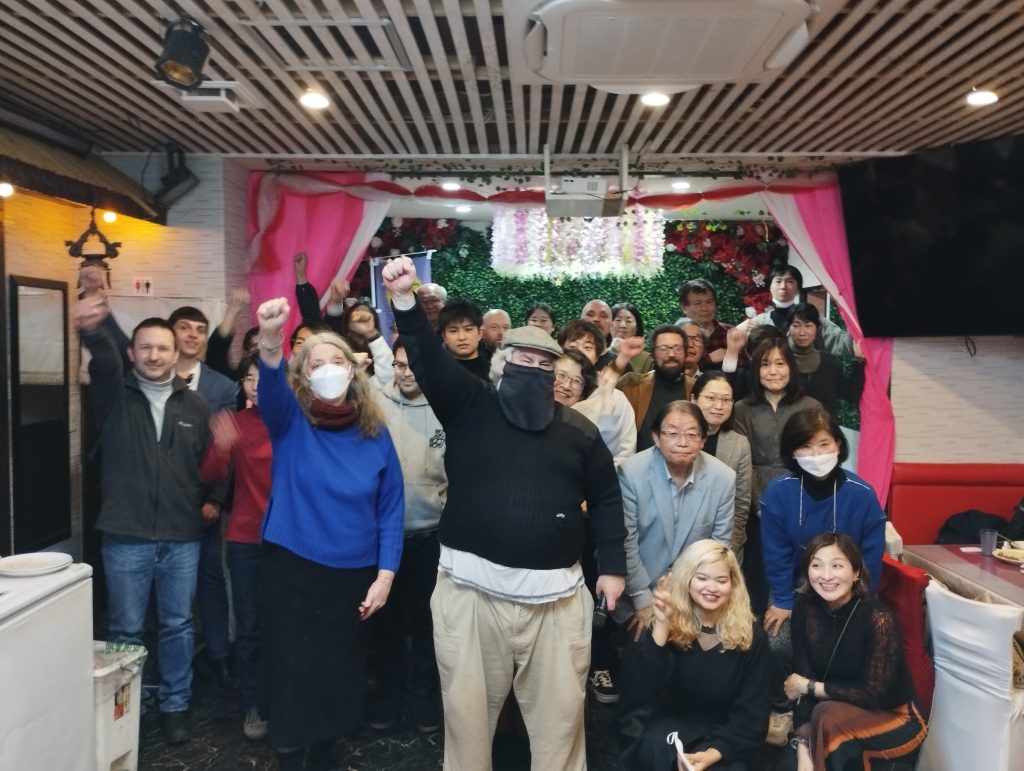
SNA (Tokyo) — US President Joe Biden ensured that December 2, 2022, will go down as a dark day in the history of the US labor movement. He signed legislation that forces railway unions to accept a miserable contract, robbing them of their right to strike for better conditions. A week prior, the Tokyo Labor Relations Commission provided us a brighter day in labor history with the first ever ruling extending union rights to those engaged in work via an online platform.
The Tokyo Labor Relations Commission ruled that Uber Eats Japan’s “delivery partners” are workers and have all three trade union rights–the right to solidarity, the right to collective bargaining, and the right to strike. The commission ordered Uber Eats Japan as well as two Uber subcontractors that handle delivery driver registration, support, and education to negotiate with the Uber Eats Union in good faith.
The delivery giant registers its deliverers as individual service providers with zero protection under Japanese labor laws, including the key Labor Standards Act and Trade Union Act.
The definition of rodosha (worker or employee) differs depending on which labor law is applied, be it the Labor Standards Act, the Trade Union Act, the National Health Insurance Act, or one of many others. The definition under the Trade Union Act has the broadest scope, so many workers have union rights, but don’t enjoy wage and other rights as stipulated in the Labor Standards Act.
Article 1 of the Trade Union Act stipulates the purpose of the law–to ensure that workers can band together (“combine” in Adam Smith’s terminology) to increase their negotiating position, come to the table with employers as equals, and improve their working conditions.
The Tokyo Labor Relations Commission had to determine whether or not Uber Eats delivery partners (in Uber’s phony circumlocution) enjoy the status of rodosha and its attendant three union rights. The corporation claims that it provides the service of “matching” restaurants and those who want to order food, and thus its platform users don’t “provide labor” to the Uber Eats platform operator.
“Uber doesn’t only provide the platform to the delivery partners,” the judgement read.
The reality is that it is in many different ways involved in the completion of the delivery, and since the delivery partners must complete their deliveries under Uber oversight, it’s hard to conceive them as being nothing more than simple “customers” (platform users). We can strongly infer the possibility of assessing what they do as providing labor to Uber, which runs the business within the overall Uber Eats business.
The following labor ministry checklist, created based on previous jurisprudence, is used to determine rodosha status under the Trade Union Act:
1. The purported rodosha are integral to the business organization
2. Contracts are written unilaterally or uniformly
3. Remuneration is in exchange for labor/work
4. The purported rodosha are expected to accept orders (i.e. not really free to say no)
5. Work hours and locations are determined by the corporation, not by purported rodosha
6. The corporation takes the key risks, rewards, and decisions who does the work
In other words, courts and labor commissions have looked not only at the words written on the contract, but also at the reality of the relationship between the corporation and the purported rodosha.
The Tokyo Labor Commission ruled September 3, 2019, that language teachers working at Gaba had all three labor union rights based on the actual relationship between Gaba and teacher, despite Gaba contracts alleging that instructors are independent service providers. The commission took cognizance of the fact that both Uber Eats and Gaba set forth strict, detailed rules that their deliverers or teachers must follow, contradicting the notion that they are merely intermediaries matching up providers and users.
Gaba appealed its loss to the Central Labor Relations Commission in a case nearing its conclusion. Uber Eats is considering its options, including an appeal to the higher body.
Platform operators like Uber are growing in number, in part due to the impact of the pandemic. Whereas it does afford platform workers a degree of freedom in terms of working times and locations, the jobs inherently lack security, social insurance, and other social safety benefits. Some have called for the drafting of legislation to protect freelancers.
So far, however, Prime Minister Fumio Kishida has not moved forward with policies to protect platform workers.
This ruling is a good first step, to be sure, but it should also be obvious. Corporations are increasingly turning to this model of treating working people and their labor as commodities to enrich themselves and their businesses, while taking zero responsibility for their rights, protections, or welfare.
Let us condemn this insidious corporate machination, even as we welcome this particular verdict.
This article was written by Hifumi Okunuki, and originally published by the Shingetsu News Agency (SNA).


